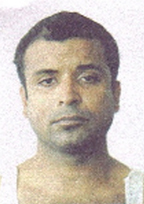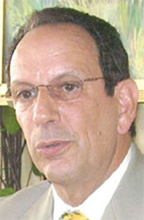Before he pleaded guilty, drug smuggler Roger Khan had ordered a local associate to find persons close to a potential witness against him and either pay or threaten them to tell the witness not to testify.
According to the US government, a scanned letter which was found on Khan’s ex-lawyer’s computer instructed his “Phantom Squad” member to contact two local businessmen as they could help locate persons close to the witness’s relatives.

The letter, seen by this newspaper, was dated May 13, 2007 and was written to a named ex-policeman, who the US government said was a “Phantom Squad” member. The US government said it was one of “numerous scanned letters written by Khan” to members of the Phantom Squad since his incarceration. It was discovered on a computer belonging to Khan’s ex-lawyers Robert Simels and Arianne Irving, which the US government had seized.
Some of the content of the May 13, 2007 letter was enclosed in a memorandum of law filed by the US government on Thursday in a bid for an anonymous jury for the trial of Simels and Irving. The two were jointly charged with Khan on witness tampering charges arising out of Khan’s drug case. Khan has pleaded guilty to that charge in addition to trafficking in 150 kilos of cocaine and gun running. His two ex-lawyers are now faced 14 charges in a superseding indictment filed by the government earlier this week; these include shipping and being in possession of the ‘spy computer’ that was seized from Khan in 2002 in Guyana.
The letter reads: “Please call ‘Dancing Man’ and tell him to make sure he pays the $ on time every month. I am happy to hear he spoke to her parents & that they are making excuses for her, ask him if he can’t have them call her to talk to my lawyers, and we can to work out something.” Khan asked in the letter that ‘Dancing Man’ stay in close contact with the parents and to keep “bugging tem, why can’t she just come back home [to Guyana]? And avoid lying on the stand.”
Khan asked the former policeman to find out who was close to the witness’s father; for instance who was his best friend. He instructed the ex-policeman to approach the principals of two city businesses, named in the letter, as they “would definitely know him.” The ex-policeman was also told to speak to another named man, to find out who the best friend did most of his business with and that he should “push this issue” as it could really help.

“You have to get someone to look him straight in the eyes and tell him that NO one will accept her attempt to testify against me, let them might as well sell everything and leave [Guyana] NOW! [Name of ex-policeman] you know if anyone of you were here [in the United States], I would have guaranteed she can’t testify, I can’t understand, offer her parents a big amount of money to persuade them, you never know… this is worth a try. Ask ‘Dancing Man’ to make the approach,” Khan’s letter said.
In the memorandum filed by the US it was stated that along with the computer, members of the US Drug Enforcement Administration (DEA) also found a box and a half of records, illegal electronic eavesdropping equipment, US$2,500, jewellery and a loaded firearm.
The prosecution in the Simels/Irving witness-tampering case is seeking to have the names, addresses and workplaces of members of jury concealed; for transportation to be provided for them to and from the courthouse for the duration of the trial and for them to eat lunch together every day. A similar request had been made in Khan’s drug case before he pleaded guilty, and Justice Dora Irizarry had granted it.
The memorandum pointed out that the two criminal attorneys are charged with conspiring and attempting to obstruct justice by tampering with potential witnesses and attempting to bribe a witness in their former client’s criminal trial.
“They are also charged with importing and possessing their client’s illegal wiretapping equipment,” it said. The government said the two lawyers have demonstrated their willingness and ability to interfere with the judicial process and they are exposed to significant prison sentences and disbarment.
According to the memorandum, the case concerns the defendants’ representation of the leader of an extremely violent, “murderous international narcotics organisation,” Shaheed Khan.
“While there is no reason to believe that either of the defendants themselves are likely to commit acts of violence, certainly their co-conspirators, all members of the Khan’s narcotics organisation, have a long history of violence,” the memorandum said. “Consequently, the evidence at trial ‘will depict a pattern of violence’ by the defendants’ accomplices, that could ‘cause a juror to reasonably fear for his own safety.’” The government further argued that if a jury questionnaire is used, jurors who are not assured anonymity will likely feel much more concerned about the information they provide to the court and parties.
Simels and Irving, the government argued, have repeatedly attempted to obstruct justice and will not hesitate to do so again.
“Concerted efforts at obstruction have included lying to gain entrance to a prison facility, offering to pay a witness money, including $10,000 to one witness, to testify falsely on their client’s behalf at trial, and plans to ‘eliminate’ perceived government witnesses by either bribing or committing acts of violence against them or their family,” the government said.
The memorandum also pointed out that neither of the two defendants is incarcerated and as such would have ample opportunity to contact jurors, either directly or through third parties.
The government also noted that the case has received wide press coverage both in the US and in Guyana, adding that while most members of the press would likely respect a court admonition not to communicate with a sitting juror the order would not prevent them from attempting to interview jurors’ family members, friends, neighbours and co-workers. The order would not also prevent the press from taking steps to line up post-verdict interviews of jurors.





